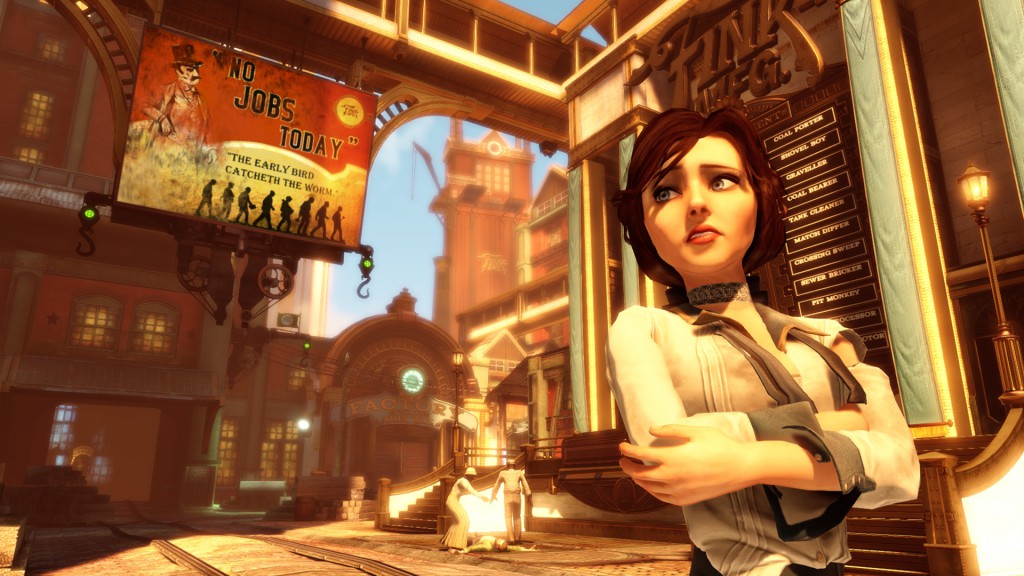Bioshock: Infinite
Irrational Games
2K Games
PS3, Xbox 360, Windows, OS X
If you’re anything like me, the ending of Bioshock: Infinite will have made you dump your controller, stare agape at the screen and yell “no!” in disbelief over and over. It is a conclusion which shakes up the game experience like no other. It is cathartic, unsettling, and joyous. It’s a clear example of the developers following the storytelling maxim of beginning at the end and working backwards while serving as an enormous impetus for players to immediately restart the game and piece together the clues that fit into this monumental narrative. I, for one, started a new game right away.
By any reasonable standard, Bioshock: Infinite is a large game. Yes, at its core, it is an on-rails shooter. But it is so much more than that. Of course there’s deep discussion of the metaphysical, of time and space, especially at the close. Yet there are so many other fascinating themes at play, many of which emerge through observing life in Columbia.
Through the lens of Ken Levine’s game, the player is invited to consider the implications of (among many others) American exceptionalism, jingoism, scientific experimentation, the class system, radicalism, and even Occupy Wall Street, the citizen movement against economic inequality as perpetuated by bankers and stockbrokers, which took place as the game was in development. It’s a dense game to wade through thematically, and nary a corner is turned without the player facing a scene that might make them reconsider their place in the world. Oh, and one that’s filled with bad guys.
It is a game which expands upon the possibilities of what players can expect from a big-budget title in terms of narrative and world-building. As Bioshock told the tale of a utopia which failed dramatically, Bioshock: Infinite is about a city in the sky that was all sheen and polish, with a vastly disturbing undercurrent. The very first combat in the game occurs as Booker DeWitt faces a choice of whether to throw a ball at and humiliate an interracial couple. Even by this point, around 20 minutes into the game, we’ve already encountered religious zealotry and racism, two cornerstones of the game.
Elizabeth is a fascinating character, infused with wonder and heart. She proves herself handy in a fight, where she can open up ‘tears’ between universes to help Booker with weapons and ammunition. While it makes sense within the structure of the story, it is disappointing to see her run for cover every time Booker enters combat, instead of standing her ground and engaging in the fight herself. Elizabeth as headstrong warrior is not the story Irrational wanted to tell, though it’s still disheartening for the company to paint the protagonist as the male protector of a female. Her captivity is the initial impetus of the plot, with Booker ordered to find and return her to New York, but the game is really about the relationship (or relationships) between her and Booker as spooled over multiple timelines and realities.
None of this is really made clear until the closing scenes, during which we not only learn what the “Infinite” of the title means, but also why Booker’s destiny is tied to Elizabeth’s, as hers is to his. It is an ending which barrages the player with a flood of information. While the whole narrative builds to this point, it is one that may prove overwhelming. It both resolves the plot and urges the player to start again immediately to search for hidden clues and learn how the gameplay, story, and ending tie together.
Bioshock: Infinite is a beautifully crafted game, not only in terms of the gameplay and visuals (including the terrific Skyline travel system), but how all of its aspects build into the larger story. It is a dense look at both what America is and what it could have been, crafting a fresh mythology players may not be used to in storytelling within a game. Given the length of game development cycles, it may be some time before we truly see the ripple effects of Bioshock: Infinite‘s effects on the industry and other titles, but this is a groundbreaking game with a lasting impact on what we can expect from major games’ stories in future.



